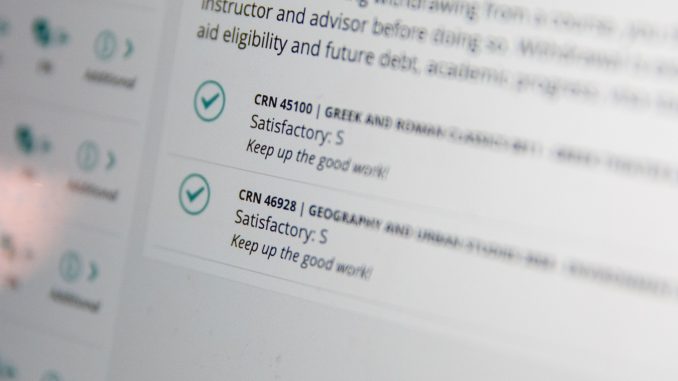
Now that we are beginning week eight of the fall semester, Temple University students will be receiving this semester’s midterm ratings.
Temple requires all professors to rate a student’s performance in class using S for satisfactory or a U for unsatisfactory during the mid-way point of fall and spring semesters. But Temple’s current rating system is not enough as it fails to give detailed feedback as to where a student’s strengths and weaknesses are, or about their progress during the semester. Students should receive more than an S or U, even if that student is doing well.
However, Temple advises students to be proactive about their education, and take it upon themselves to make necessary improvements to their grades.
The purpose of progress reports is to encourage students to communicate with their instructors through the use of office hours or another kind of proactive action that could help them, said Daniel Berman, the vice provost for undergraduate studies
As a person who checks their grades for each class after every graded assignment, I know where I stand academically. But for students who don’t check their grades regularly, the midterm ratings should tell students where they stand academically in classes. However, they currently don’t provide students with those answers.
If Temple cares about the education and success of their students, the university should require professors to meet with students who have a B minus or lower to provide them with constructive feedback and suggest what the student needs to improve.
“The whole idea of the midterm progress rating is that it’s not a grade,” Berman said. “It’s a way for us to prompt communication between students and their instructors before they might go off the rails to the point that it would be hard or even impossible to recover.”
When students receive a U for unsatisfactory without receiving proper feedback from a professor, students may not know how to improve their grades.
“I’m not a fan of U for unsatisfactory, I don’t really like that whole method,” said Taylor Sylvester, a junior media studies and production major. “You’re writing a letter on a piece of paper, but can you explain to me why I have this grade, or what I can do better?”
Temple needs to improve their midterm rating systems and explain to students what they need to do to improve, Sylvester said. Professors should also email students individually to set up Zoom or face-to-face conferences for students.
Every student at Temple works and learns things differently. Temple should require professors to provide detailed feedback about students’ performance in the class during midterm ratings.
A professor made the effort to check in with Adia Eilam and talk about her grades, even though she was rated an S last semester.
“Even when a student is rated satisfactory, the professor should still provide ways for them to stay on the right track,” Eilam, a sophomore media studies and production major, said.
Progress reports are most productive to a student’s learning when they provide students with an explanation of the quality of their work, according to the University of South Carolina.
There are distinctions in the satisfactory and unsatisfactory categories that try to give a more targeted message to a student if they’re not doing well, and what it is they might improve, Berman said.
For example, if a student earns a “U-A”, it may be due to poor attendance, and if a student earns a “U-AG” it may be due to poor attendance and poor grades, Berman wrote in an email to The Temple News.
However, Clarence Remy, a sophomore mechanical engineering major, has never learned anything from previous midterm ratings, he said.
“It doesn’t help, it doesn’t change anything,” Remy said. “It’s just there.”
Temple needs to be proactive with their ratings, provide constructive criticism and follow up with that criticism, Remy added.
Students deserve a midterm rating policy that is beneficial to them and has detailed feedback. Temple must require professors to meet with students and provide ways for them to improve their grade.Because midterm ratings can foreshadow the outcome of a student’s semester, they are just as important as final grades, and Temple must treat them as such.



Be the first to comment